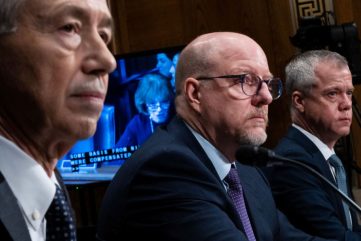
The Senate Health, Education, Labor, and Pensions (HELP) Committee grilled the CEOs of major pharmaceutical companies on what chairman Senator Bernie Sanders labelled “the outrageously high cost of prescription drugs” in the US. Despite intense interrogation, the CEOs made no solid commitments to improve drug prices in the US.
The February 8 hearing allowed US senators to question the CEOs of Merck & Co (MSD), Bristol Myers Squibb (BMS) and Johnson & Johnson (J&J) about their drug prices in the US and potential solutions to target high costs.

Discover B2B Marketing That Performs
Combine business intelligence and editorial excellence to reach engaged professionals across 36 leading media platforms.
Sanders highlighted price discrepancies between the US and other countries, pointing out that the list price for MSD’s Keytruda (pembrolizumab) is approximately $191,000 in the US, but $112,000 in Canada.
On the issue of differential pricing in different countries, BMS CEO Chris Boerner said that the lower prices in countries such as Canada reduced access to essential medications. He said that patients often received new medicines much later than the US and drug development innovation in the US healthcare system was better due to the structure of the healthcare system.
New Hampshire Senator Maggie Hassan also questioned the executives about the filing of numerous patents to eliminate generic competition in the pharmaceutical market for several years. Robert Davis, MSD’s CEO, defended the filing of 168 patents for Keytruda while Boerner denied accusations that BMS was against generic competition. Boerner’s defence was made after Hassan highlighted BMS’s two lawsuits that involve, blocking Eliquis (apixaban) generics from the US market until 2028.
Joaquin Duato, J&J’s CEO, placed the blame for limited drug access on “burdensome” copay obligations. Duato said J&J has begun attempting to alleviate the problem through its copay assistance programmes, supporting over one million patients in 2022. He also defended J&J saying: “In 2022, the average net price of our medicines declined for the sixth year in a row by 3.5%… In 2022, alone we paid $39bn in rebates, discounts and fees, almost 60% of the average list price of our drugs with the intent that patients benefit from these substantial cost savings.”

US Tariffs are shifting - will you react or anticipate?
Don’t let policy changes catch you off guard. Stay proactive with real-time data and expert analysis.
By GlobalDataThe three CEOs stood behind their current pricing strategies, with Duato stating: “Our prices are based on the value our medicines bring to patients, the healthcare system, and society.” When questioned by Senator Murphy about price caps, Duato added that they “are not the way that innovation is going to be fostered”.
Other drugs that came up during the pricing discussion included J&J’s autoimmune disorder drug Stelara (ustekinumab), which has a list price of $79,000 annually in the US, and MSD’s diabetes drug Januvia (sitagliptin), which costs $6,900 in the US, whilst the therapy is sold for $900 in Canada and $200 in France.
The hearing came a few days after select pharmaceutical companies had initiated negotiations with Centers for Medicare and Medicaid Services (CMS) regarding prices of ten chosen drugs under the Inflation Reduction Act. Once the negotiations are complete, updated prices will go into effect in 2026.




